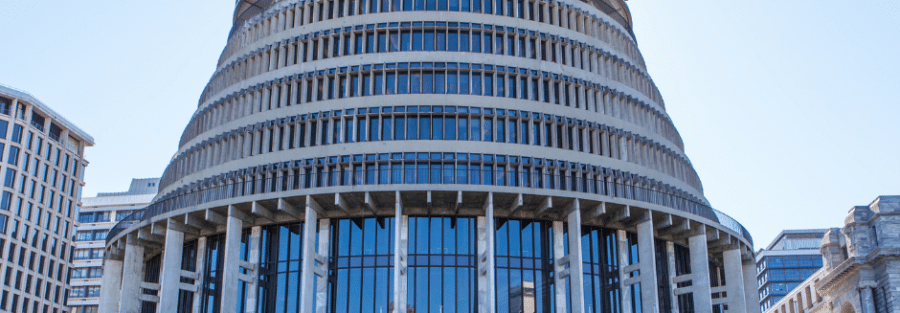New Zealand’s general election on 14 October 2023 is fast approaching. As is customary, tax policies continue to be a prominent subject of debate as the election approaches.
During the lead up to the election, the various political parties’ tax policies have been grabbing headlines. Some parties advocate for sweeping alterations to our tax system, while others put forward more conservative adjustments.
The exact mix of tax changes will obviously depend on whether Labour or National leads the next government. Recent polls indicate that neither party holds a decisive majority, setting the stage for a potential coalition government.
These surveys underscore a noticeable shift away from the two major political parties in favour of smaller, minor parties. Parties such as ACT, The Green Party, NZ First and Te Pāti Māori. It’s therefore likely that one or more of these parties will help decide the direction of our next government.
Inflation, the cost of living, and the overall state of the economy continue to be significant concerns for many New Zealanders. Taxation policies play a crucial role in addressing these issues as they serve to generate revenue, redistribute wealth, and encourage specific behaviours.
As the election is less than two weeks away, let’s take a closer look at the tax policies proposed by some of the key minor political parties.

Personal Income Tax Rates and Thresholds
The Green Party wants to introduce a new tax-free threshold on the first $10,000 and adjust other tax rates. It also proposes to introduce a new top tax rate of 45% on income above $180,000.
Other tax brackets will be 17% on income of $10,001 to $50,000, 30% for earnings of $50,001 to $75,000, 35% for income between $75,001 and $120,000, and 39% for income between $120,001 to $180,000. The Party will index these rates to inflation and adjust them every three years.
The ACT Party commits to dramatically simplifying our income tax system by restricting the tax brackets to two. All income up to $70,000 would be taxed at 17.5%. Income above this would be taxed at 28%. The Party would also introduce new tax credits for low- and middle-income earners.
Te Pāti Māori propose to introduce a tax-free bracket for income under $30,000, and a 48% tax on income exceeding $300,000. It further proposes 15% on $30,001 to $60,000, 33% on $60,001 to $90,000, 39% on $90,001 to $180,000, 42% on $180,001 to $300,000.
NZ First has no plans to adjust the percentage rates but would adjust the thresholds for inflation.
Company and Trust Tax Rates
Both the Green Party and Te Pāti Māori are advocating to increase the company tax rate to 33%. The ACT Party has expressed no intentions to modify the current 28% rate.
Neither Te Pāti Māori, NZ First or the ACT Party have signalled any intention to alter the trust rates. However, The Greens propose to increase it to 39%.
Property and Investment Taxes
The Green Party advocates implementing a comprehensive capital gain taxes. In contrast, ACT strongly opposes a capital gains tax system and proposes to immediately reinstate interest deductions for rental properties. It would also abolish the Bright-Line Test.
Te Pāti Māori, on the other hand, puts forward the idea of introducing a Land Banking Tax, which would impose a 33% tax on the increase in land value for properties that remain undeveloped four years after purchase (with exemptions for Māori freehold land). Additionally, it proposes a 33% Vacant House Tax based on the market value of properties that remain unoccupied for six months or more.
NZ First has not provided any official statements or positions regarding property and investment taxes.

Wealth Tax
The ACT Party has no plans to introduce a wealth tax. NZ First has not released any statements on wealth tax.
The Greens would introduce a 2.5% wealth tax on the value of net assets above $2 million for individuals and $4 million for couples (who hold assets jointly).
Values would be determined after deducting mortgages and other debts related to the asset). Most types of assets would be subjected to the wealth tax, including real estate, investments, and artwork. The Party also proposes a 1.5% tax on all assets held in a private trust.
Te Pāti Māori proposes to introduce a 2% wealth tax for net wealth over $2 million, 4% for net wealth over $5 million, and 8% for net wealth exceeding $10 million.
Tax has become a highly contentious issue in this election with several different party proposals and approaches to compare.
Hold tight and remember your vote counts. Contact us at Business Advisory Services if you’d like to explore how these proposed tax policies might impact you or your business.




2 Comments
Karen
Thank you for summarising a complicated subject. I found this very enlightening and informative.
Mike
Your article provides a comprehensive overview of the tax agendas of various political parties. It’s nice to see a balanced analysis. Understanding the tax policies of different parties is crucial and your article serves as a valuable resource for that purpose.